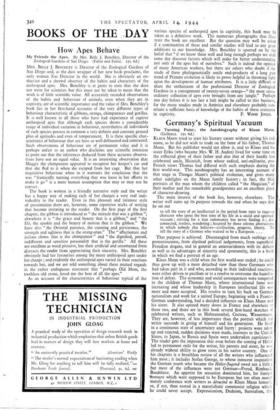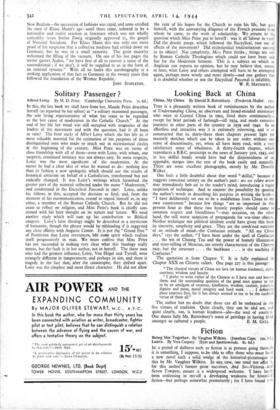Germany's Spiritual Vacuum
KLAUS MANN tried to start his literary career without giving his real name, as he did not wish to trade on the fame of his father, Thomas Mann. But his publisher would not allow it, and so Klaus and his sister Erika (who became Mrs. W. H. Auden) lived for some time on the reflected glory of their father and also that of their hardly less celebrated uncle, Heinrich, from whose radical, anti-militarist, pro- French views Thomas had differed with such emphasis during the first world-war. This autobiography has an interesting account of that stage in Thaws Mann's political evolution, and gives many other Sidelights on the Mann family history ; in fact, the filial portraits of the man whom the children called "the Magician," of their mother and the remarkable grandparents are an excellent piece of character-drawing.
The main interest of the book lies, however, elsewhere. The writer well sums up its purpose towards the end when he says that he set out
to tell the story of an intellectual in the period from 1920 to 1940—a character who spent the best time of his life in a social and spiritual vacuum ; striving for a true community but never finding ; dis- connected, restless, wandering ; haunted by those solemn abstractions in which nobody else believes—civilisation, progress, liberty. To tell the story of a German who wanted to be a European....
That purpose is achieved. Disentangled from much verbiage and pretentiousness, from slipshod political judgements, from superficial Freudian slogans, and in general an amateurishness with its defects as well as its advantages of sincerity and spontaneity, this is a book in which we find a portrait of an age.
Klaus Mann was a child when the first world-war ended ; he could thus grow up with a more detached view than those Germans who had taken part in it and who, according to their individual reactions, were either driven to pacifism or to a resolve to overcome the humilia- tion of defeat. The economic and social consequences were tempered to the children of Thomas Mann, whose international fame was increasing and whose leadership in European intellectual life was more and more accepted. His resolve to turn his back on German nationalism and work for a united Europe, beginning with a Franco- German understanding, had a decided influence on Klaus Mann and his sister. It also opened many doors in France and elsewhere to these two, and there are in this book several first-hand sketches of celebrated writers, such as Hofmannsthal, Cocteau, Wassermann. They are, howester, of less importance than the portrait which the writer succeeds in giving of himself and his generation. He lived in a continuous state of uncertainty and hurry: projects were taken up and rejected, sudden decisions were made, journeys to the United States, to Japan, to Russia and Spain were undertaken capriciously. The reader gets the impression that even before the coming of Hitler led to permanent exile for the writer, his parents and sister, he was already without ability to grow roots in his native country. One of his chapters is a breathless review of all the writers who influenced him most ; it includes Stefan George, to whose innocent inspiration the German youth who became the Hider-jugend owed not a little ;
but most of the influences were not German—Freud, 'Rimbaud, Baudelaire. An appetite for sensation dominated him, for foreign
illontacts which were supposed to be European but too often meant merely conference with writers as deracine as Klaus Mann himself, or, if not, then rooted in a materialistic communist religion which he could never accept. Expressionism, Dadaism, Surrealism, the New Realism—the succession of fashions was rapid, and none satisfied the men of Klaus Mann's age—until there came, ushered in by a nationalist and realist reaction in literature which was not wholly unhealthy (even Stefan Zweig originally approved it), the gospel of National Socialism. For 'Klaus Mann this was only one more proof of his suspicion that a collective madness had settled down on Germany, but he was in a small minority. The great majority welcomed the filling of the vacuum. On one of his last pages the Writer quotes Auden, " we have first of all to recover a sense of the unconditional ; if we don't, it will be supplied to us in the form of an external tyranny." With all its faults this .autobiography is a striking application of that fact to Germany in the twenty years that followed the foundation of the Weimar Republic.•
JOHN STAPLETON.



























 Previous page
Previous page